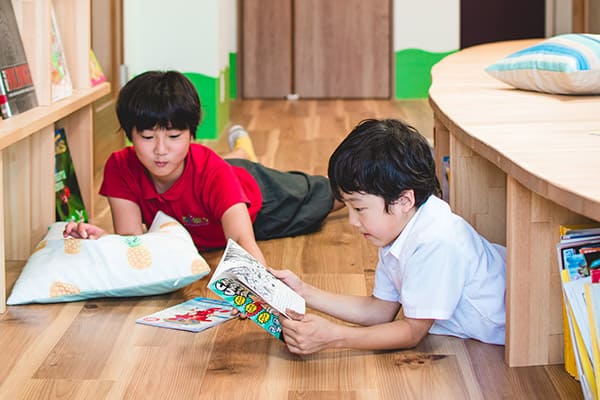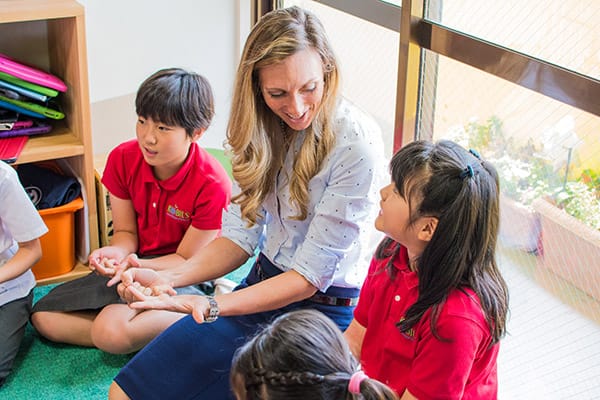Kobe Bilingual School
HOME | KINDERGARTEN | ELEMENTARY | SUBJECTS | FAQ | COMPARISON | FEATURES | FEES
Elementary Curriculum:
KOBILS meets Scotland’s Curriculum for Excellence (CfE) and Japan’s Kokugo and Social Studies Curriculum
Kobe Bilingual School has grown over its 10 years with a program that promotes learning and progression, and motivation and engagement as the driving forces behind curriculum choice and learning outcomes. With this in mind KOBILS has adapted Scotland’s CfE for use in our elementary school alongside Japan’s Kokugo curriculum and elements of the social studies and ethics curriculum.
Key Reasons for Choosing Scotland’s Curriculum for Excellence (CfE) at KOBILS
CfE is learning driven not assessment driven: In an age where many school curriculums in the English speaking world and beyond are becoming overly assessment driven and content heavy, CfE attempts to redress the balance between assessment and learning putting learning at the forefront. The curriculum is defined by learning outcomes and demonstrable achievement and not defined by test success; there is no emphasis on multiple choice type learning that can easily be tested but on whole learning that can be demonstrated.
CfE starts with where the children are and encourages progress in the individual, and is not focussed on one size fits all grade level learning: CfE recognises school years that correspond to British, American, and Japanese grade and year levels. However CfE allows that children of the same age may be performing at different academic levels and thus describes experiences and outcomes throughout the whole curriculum without ceilings. Grade/year levels are divided into 5 groups across the curriculum for children aged 3-18, Early, and levels one through 4. So KOBILS is concerned with progress rather than everyone being at the same level and achieving at the same pace. This is reflected in mixed grade classes for homeroom and pull out level specific learning for English, Japanese, and math.
Experiences and outcomes are set out in lines of development so children may progress faster, slower or at different speeds than their peers, and at different speeds in different subjects. Children who show an early aptitude for math, or Kanji learning, can learn faster, while children who are struggling to grasp concepts can take longer so they build a firm foundation before moving to the next level. This recognition of success and progression means all children can achieve success and slow starters as well as high achievers can build positive learning identities, find their strengths and challenge themselves to overcome weaknesses. Starting slowly or early academic success does not need to define a child; anything is possible and creativity, strength, and an interest in life-long learning ensure success for all.
CfE sees school subjects as both separate and integrated: Children study each subject individually, but also have opportunities to synthesise their learning with multi-disciplinary project based learning. CfE aims to teach subject content but also pull together the different school subjects so children see how the subjects fit together. In this way they can not only understand what they are learning, but why they are learning it and how it aids them, and see for themselves their progression.
CfE is internationally minded: Scotland is a small country with a bigger, arguably more influential neighbour. As such Scotland is outward looking not inward looking taking a natural place in Europe and the world. The Scottish curriculum therefore is a diverse curriculum that is readily adaptable to our needs here in Japan.
CfE has a place for real world learning: CfE promotes real world learning and provides room in the curriculum for that. This is an important guiding principle in the creation of the KOBILS curriculum. An example of this is KOBILS Money and Me project as part of our life skills class. Children entering KOBILS open a local post office account and money is deposited annually by parents. Children decide as a group how that money will be spent: on presents and pocket money, charity, and money raising events. Children learn about depositing, spending and earning money, internet banking and more throughout their years at Kobe Bilingual School. Other life skill projects include basic cooking, learning to use tools such as screwdrivers and saws, learning about electricity, gas and water and how they are brought to their homes, and so on.
CfE allows a lot of flexibility which means we can make our Japanese curriculum fit and adapt the curriculum for our context here in Kobe, Japan.
These key aspects drive the adoption of Scotland’s CfE at KOBILS, alongside elements from Japan’s curriculum and unique KOBILS adaptations.
HOME | KINDERGARTEN | ELEMENTARY | SUBJECTS | FAQ | FEATURES | FEES


